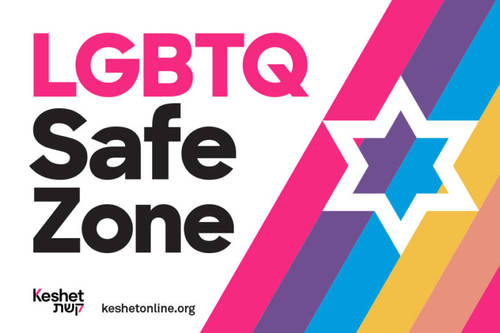Day 8: Armed With Ancestors
The Book of Exodus says, “the Israelites went up armed out of the land of Egypt.” While many if not most classical commentators understand this passage to mean that the Israelites brought weapons with them, anticipating the inevitable conflicts ahead, some contend that the Children of Israel left Egypt spiritually, rather than physically, armed. According to a midrash, the Israelites fortified themselves by holding fast to the memories and moral models of Abraham, Isaac, Jacob, Moses, and Aaron (Midrash Tanhuma, Parashat Beshallah), recognizing that their strength lies less in the example of their power than by the power of their example, that more important than winning every fight was maintaining faith the the ideals they were called to fight for. God, speaking through the biblical prophet Jeremiah, says, “Let not the wise man glory in his wisdom; Let not the strong man glory in his strength; Let not the rich man glory in his riches. But only in this should one glory: In one’s earnest devotion to Me. For I the Infinite act with kindness, Justice, and equity in the world; For in these I delight —declares the Infinite” (Jer. 9:22-23). We merit to become God’s covenantal partners not by flexing our might, but by doing what is right.
Day 9: Rushing to Embrace the Dawn
My young children (ages 8, 6, and 3) are early risers. It’s not unusual for one or more of them to wake up well before sunrise, bounding out of bed with excitement and unbridled energy. While this trait can be a little, well, exhausting, at least for the grownups in the house, their enthusiasm is also inspiring. My children see each new day as a singular and infinitely precious blessing, filled with endless possibility. They wake up convinced that something special is out there, just waiting to be discovered; that there are so many important things to do in so little time. How could they not zealously rush to embrace the dawn? And what’s more -- rare is the day when they don’t discover something special, build something beautiful, or encounter something that is to them extraordinary. Indeed, perhaps their exuberant disposition is precisely what facilitates such experiences. Similarly, according to a rabbinic legend, the Children of Israel hurried eagerly out of Egypt, eager to experience freedom, encounter the Divine, and enter into the Promised Land. And perhaps it was their enthusiasm that ultimately made their emancipation and enlightenment possible.
Day 10: Judaism’s First Law of Spiritual Mechanics
Do we humans have free will, or merely the illusion of free will? Some thinkers, influenced by contemporary science, argue the latter, that all of our actions and reactions are programmed into our genes, regulated by our brain chemistry, and conditioned through evolution and environment; that everything we think, say, and do is a product of synapses firing and chemicals secreting; and that we are little more than machines who delusionally believe themselves to be conscious. Jewish tradition, on the other hand, has historically insisted that human beings are truly, uniquely, free. Revelation, after all, is only meaningful if we could choose whether to accept it or reject it, to follow it or to flee from it. This insistence doesn’t mean, however, that Jewish tradition would reject the science, choosing faith over fact. Instead, Jewish tradition would argue something similar to Isaac Newton’s first law of motion -- that, by nature, we humans are predisposed to act in certain ways unless we are influenced, directed, or redirected by some countervailing force. Call it Judaism’s First Law of Spiritual Mechanics. Thinkers have variously called this countervailing force “soul,” “consciousness,” “self,” “divine spark,” or other names, but the idea is the same -- that all of us have the capacity to dominate our inclinations and make fully free choices. However, we can’t make those choices unless we are first aware of and sensitive to our predispositions. When the Torah teaches that God leads the Israelites away from the land of the Philistines, lest they flee in fright back to Egypt when they encounter war (Ex. 13:17), it is alluding to this insight. When we are mindful of our innate reactions, we can choose to go a different way. Covenant requires cognizance.
Day 11: Slow Down
Quicker is sometimes better. Many of us proudly live life in the fast lane. We are perpetually busy with important work obligations, family responsibilities, and more, and are constantly moving from one appointment to the next, our minds always partially fixed upon our lengthy to-do list. The problem with this way of living, however, is that we may do a lot but, paradoxically, we miss out on everything. We overlook the wonder of our children discovering the world, learning how to navigate life, and growing into maturity. We fail to nurture our relationships with family members, close friends, and spouses. We ignore our minds, stifle our spiritual yearnings, and neglect our bodies. Many of us are moving so fast we barely even taste our food, let alone pause to appreciate the many mundane miracles involved in getting a meal to our plates. Perhaps that’s why, when God brings the Israelites out of Egypt, they take the long way; teaching them, and reminding us, that in order to hear God’s voice in our world and in our lives, we have to slow down.
Day 12: Resentment Impedes Revelation
The Torah teaches that, before leaving Egypt, Moses takes the bones of the long-deceased patriarch Joseph, fulfilling a promise made between Joseph and his brothers, the other sons of Israel. Recall that there was a history of conflict between Joseph and his brothers: they were jealous of his entitled status in the eyes of their father, and he gloried in that privilege; they sold him into slavery, and, many years later, when Joseph was in a position of power and the brothers were in a weak spot, he oppressed them; ultimately, all of them participated in a chain of events that resulted in their descendants becoming enslaved for hundreds of years. When the Torah recalls the brothers’ deathbed vow to Joseph, it uses a peculiar and repetitive phrase, “השבע השביע,” a term that has no elegant literal translation. Ancient sages, always sensitive to unusual phrasings in the text, wonder why the Torah employs this seeming redundancy, and settle upon this answer: both the brothers and Joseph made vows to each other, indicating that neither party harbored hostility against the other (Exodus Rabbah 2:19). By taking Joseph’s bones, Moses affirms that the brotherly animosity remains dead and buried, reminding us that individuals who wish to forge the bonds of peoplehood and to enter into covenantal relationship with the Divine must have hearts free of old grudges.
Day 13: Pay Attention
It is said that, to master a subject or an activity, one must devote at least 10,000 to it. While the exact number of hours is a matter of dispute, and while our natural talents certainly play a role, it is certain that, in many important ways, the course of our lives is determined by what we choose to pay attention to. If we were to accurately tabulate the time we spent on various pursuits and activities, we would know definitively what was important to us, and what was relatively insignificant; chances are good that we’d be much more adept at the things we spend more of our time doing than the things to which we devote less time. That’s why Jewish tradition urges us to “engage in [Torah] day and night” (Josh. 1:8). We can’t expect to live godly lives unless we immerse ourselves in godly wisdom and instruction. According to a midrash, God instills this value in the Children of Israel immediately after leaving Egypt (Otzar ha-Midrashim, Shemot, p. 140). The Torah notes that God leads the Israelites in the wilderness with pillars of cloud and fire by day and night that “never ceased” (Ex. 13:22), and the rabbis contend that this was meant to model for the people how to receive Torah. To experience God’s light and presence in our lives, we must never cease devoting our time and attention to them.
Day 14: Face Your Fears
Soon after the Children of Israel leave Egypt, God has them turn around (Ex. 14:2). A midrash teaches that this was so Pharaoh wouldn’t be able to say that the Israelites fled (Otzar ha-Midrashim, Shemot, p. 141). Part of the work of shaking off Pharaoh’s yoke was demonstrating -- to their former master, but more importantly to themselves -- that they were no longer afraid. So long as their fears held them back, binding them to Pharaoh, they would never be able to embrace the covenant God was offering them and forge a new future. To open ourselves to God’s relational call, we have to turn to face our fears; or, at the very least, we have to be prepared to continue moving forward despite them.
 Sisterhood Welcomes Tim Kaine
Sisterhood Welcomes Tim Kaine



